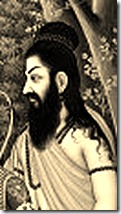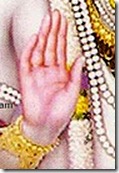 “Vishvamitra gave them his blessing and they all became happy, like a new kalpa creeper being watered with pure nectar.” (Janaki Mangala, 17) “Vishvamitra gave them his blessing and they all became happy, like a new kalpa creeper being watered with pure nectar.” (Janaki Mangala, 17)kausika dīnhi asīsa sakala pramudita bhaī | sīncīṃ manahum̐ sudhā rasa kalapa latā naīṃ || Picture a new creeper in the ground that is just waiting to be watered. There is so much potential, as from a tiny little seed a giant tree bearing many fruits can emerge. A tree that produces fruits is considered pious, for it does more than just provide oxygen to the world. Just from the fruits freely provided by a pious tree one can survive. While it seems like an austerity measure to live only off of fruits, if one is destitute and has no other source of provisions, the tree that is nature’s property is there to give protection, both from the scorching hot rays of the sun and the pangs of hunger. If you water the creeper with what it really needs, such as pure water, the growth spurt will be amazing. Indeed, the tender’s primary objective is to make conditions such that the growth will take place in the most wonderful way, blessing the eyes with a vision to remind the individual of the miracle of life, how a living being can flourish when properly taken care of. The proper care offered to the creeper is an act of love, and the reward for that love is the freedom of growth, the ability for the tree to shine in all its glory.  The cow The cowWith the careful protection offered to the living entities that are completely helpless, the resulting fruits give both sustenance and a respect for life. This is naturally known to the living entity, for otherwise pets would never come into the home. With a cat or dog, there is much work required for maintenance, but the companionship resulting from that care is considered so blessed that the work is deemed worth it. With the valuable human form of body, the offering of love and respect to one particular entity brings such a pure nectar in return that the potential for bliss bursts out. This was seen with a famous meeting many thousands of years ago which Goswami Tulsidas Who was involved in this meeting? A famous king named Dasharatha was ruling over Ayodhya when he was visited by Kaushika, the son of Gadhi named Vishvamitra. The king already had a royal priest named Vashishtha and other members of the brahmana, or priestly, class around him all the time, but he was still excited at the prospect of meeting Vishvamitra. The king was wealthy and his primary occupational duty was to provide protection to the citizens. What benefit then could be gained by meeting someone who was at the time living in the forests? Only a recluse chooses to abandon civilization and go meditate somewhere all by themselves. Vishvamitra had no money, and he wasn’t asking for any type of material reward from Dasharatha. What could be the purpose of his visit and why would Dasharatha be thrilled upon the sight of him?  In ancient Vedic culture, which is based on the teachings handed down by the Supreme Lord at the beginning of time, the priestly class takes to an austere lifestyle on purpose. Not just to punish themselves, the lack of material attachment allows for enlightenment to accelerate more rapidly. Think of trying to study while you’re intoxicated and you can begin to understand the effect material attachment has on the ability to focus on the bigger picture. In the feverish pursuit to acquire possessions and security in family life, what gets lost is the knowledge of impending death. We know that we will grow old and die some day; if we are lucky. Sometimes people don’t even make it to old age. The end is guaranteed, so rather than just ignore it, the wise tact is to figure out why it happens and what can be done to find the most beneficial future afterwards. In ancient Vedic culture, which is based on the teachings handed down by the Supreme Lord at the beginning of time, the priestly class takes to an austere lifestyle on purpose. Not just to punish themselves, the lack of material attachment allows for enlightenment to accelerate more rapidly. Think of trying to study while you’re intoxicated and you can begin to understand the effect material attachment has on the ability to focus on the bigger picture. In the feverish pursuit to acquire possessions and security in family life, what gets lost is the knowledge of impending death. We know that we will grow old and die some day; if we are lucky. Sometimes people don’t even make it to old age. The end is guaranteed, so rather than just ignore it, the wise tact is to figure out why it happens and what can be done to find the most beneficial future afterwards.Thankfully the mind is not left on its own in this regard. It doesn’t have to sit in a room and try to figure out the differences between matter and spirit, why there is birth and death, and what happens to the individual while their body continually changes. This information is already presented by the Supreme Lord in His Vedic literature, the most widely read work of which is the Bhagavad-gita The truths of the Vedas need not be accepted solely on blind faith. Surely this method can help in the beginning, provided that the principles accepted are valid. The teachings are meant to affect behavior, to change the course of action so that the proper end can be reached. Therefore the more important aspect is to practice the principles, which concomitantly bring about a higher understanding. The principles create the conditions necessary for attaining enlightenment, for they remove the distractions and foster an environment where the truths can be both accepted and understood, so much so that the faithful follower soon is wise enough to teach others the same principles. This was the case with Vishvamitra. He was living in the forest to dedicate his life to serving God, but this didn’t mean that he had abandoned contact with the world. He knew that faithfully following his religious obligations would allow him to better serve humanity. His visit to Ayodhya was an example of this, and Dasharatha, as a pious king, was also aware of Vishvamitra’s high standing. Immediately upon seeing the sage, the king arose and offered his respects. He openly declared that he was the most fortunate person in the world for having the muni’s vision. The king’s queens and their sons soon entered the room and lovingly offered their respects to Vishvamitra’s feet. In the above referenced verse from the Janaki Mangala, Goswami Tulsidas makes a nice comparison to describe what happened next. Vishvamitra gave them all his blessing, and they in turn became very happy. Their reaction indicated that they knew his blessing meant something, for Vishvamitra was not a pretend guru or a spiritualist in name only. From his blessing could come the knowledge and auspiciousness necessary for carrying out one’s prescribed duties in life. One who follows their prescribed duties, keeping devotion in mind, reaches the highest end. It doesn’t matter whether one is a priest, administrator, businessman, or laborer, if they follow the duties of their order and listen to the kind words of advice from those who know the real religious principles, they can put a stop to birth and death within this very lifetime. The blessing given by Vishvamitra and the resulting response from the queens and children was compared to a new creeper being nourished with pure nectar. The kalpa creeper is a sort of heavenly plant that can grow into a tree that provides whatever one desires. If it is nourished with pure nectar, it will grow more rapidly. This is the case with any living entity, for if we put the best ingredients into our body, we will remain fit and strong. A living being provided pure love receives the most important nourishment. The blessing of Vishvamitra was considered pure nectar because the sage was in good standing with the Supreme Lord. Tulsidas pays Vishvamitra the highest compliment through this comparison. For the queens, their children being blessed by the muni meant that their worries could be alleviated for but a brief moment. The good parent never stops worrying about their child, no matter how old they get. In the case of Dasharatha and his queens, the concern was over the welfare of the children and whether or not they would grow up to be pious. A child that matures to the point that they can eat and sleep comfortably hasn’t really done much in life, for even the animals are given provisions by nature. The aim of human life is to follow dharma, which is the only way to reach the highest end. Someone who lived by dharma blessed children who would grow up to be protectors of dharma; such was the beauty of the interaction. Vishvamitra’s real intention in visiting Ayodhya was to borrow one of Dasharatha’s sons, Rama. This young child, though Dasharatha’s favorite, would have to protect Vishvamitra from the attacking Rakshasas in the forest, terrorist-like figures who were recently being a tremendous nuisance on the peaceful sages looking to practice their asceticism.  Rama was none other than the Supreme Lord, which made the interaction with Vishvamitra even more amazing. There is no way to measure God’s love for the brahmana class that follows their prescribed duties. If not for the priests practicing the principles of dharma, who would guide society? Even in modern times where it is difficult to find a bona fide brahmana, the presence of a few pious leaders can provide tremendous benefit to at least some people, who can then pass on the same teachings to future generations. Rama was none other than the Supreme Lord, which made the interaction with Vishvamitra even more amazing. There is no way to measure God’s love for the brahmana class that follows their prescribed duties. If not for the priests practicing the principles of dharma, who would guide society? Even in modern times where it is difficult to find a bona fide brahmana, the presence of a few pious leaders can provide tremendous benefit to at least some people, who can then pass on the same teachings to future generations.This incident underscores the importance of having contact with someone who is practicing the principles of religion Anyone who is fortunate enough to meet a person practicing devotion becomes blessed as well, for the person lovingly chanting the holy names is not stingy in revealing the secret to their success. Anyone who is sincerely interested in hearing about God and devotion to Him will be given the nectar for their ears by the devotee already following bhakti. The queens and their sons eagerly and happily paid their respects to the muni and he in return gave them his blessing. Such an exchange wasn’t required because of the nature of Dasharatha’s four sons [they were all expansions of Godhead], but the flow of love could not be stopped. The fountainhead of matter and spirit has respect and honor for the priestly class, so the merits in receiving the dust from the lotus feet of the sages are shown through the Lord’s personal behavior. In Closing: Careful seed in the tender ground to sow, Water it so that tall it will grow. The kalpa tree is the best of them all, Provides benedictions to one and all. Give pure nectar to creeper to grow fast, Will then provide tastiest fruits that last. This comparison used to describe meeting, Muni king’s wives and sons joyfully greeting. Son of Gadhi gave them his blessing in return, Permanent spot in Ramayana history him did it earn. |
Search This Blog
Wednesday, January 11, 2012
Showering Nectar
Subscribe to:
Post Comments (Atom)
No comments:
Post a Comment